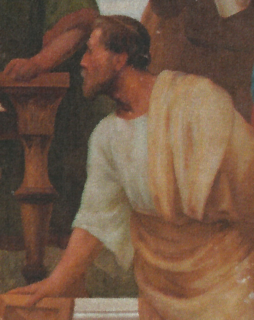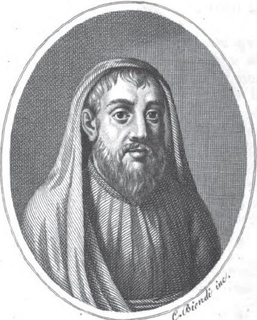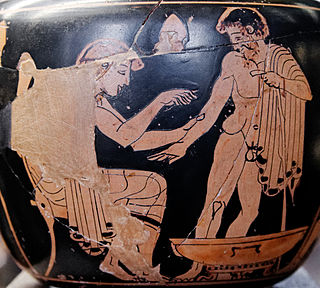Moschion,, a physician quoted by Soranus, Andromachus, and Asclepiades Pharmacion, and who lived, therefore, in or before the 1st century. He may be the same person who was called the Corrector, because though he was one of the followers of Asclepiades of Bithynia, he ventured to controvert his opinions on some points.

Alexander of Tralles in Lydia was one of the most eminent of the ancient physicians. His date may safely be put in the 6th century AD, for he mentions Aëtius Amidenus, who probably did not write until the end of the 5th or the beginning of the 6th century, and he is himself quoted by Paul of Aegina, who is supposed to have lived in the 7th century; besides which, he is mentioned as a contemporary of Agathias, who set about writing his History in the beginning of the reign of Justin II, about 565.
Aëtius of Amida was a Byzantine Greek physician and medical writer, particularly distinguished by the extent of his erudition. Historians are not agreed about his exact date. He is placed by some writers as early as the 4th century; but it is plain from his own work that he did not write till the very end of the 5th or the beginning of the 6th, as he refers not only to Patriarch Cyril of Alexandria, who died 444, but also to Petrus archiater, who could be identified with the physician of Theodoric the Great, whom he defines a contemporary. He is himself quoted by Alexander of Tralles, who lived probably in the middle of the 6th century. He was probably a Christian, which may account perhaps for his being confounded with Aëtius of Antioch, a famous Arian who lived in the time of the Emperor Julian. He is amongst the earliest recorded Greek physicians of the Christian faith.
Aelius Promotus was an ancient physician of Alexandria, of whose personal history no particulars are known, and whose date is uncertain. He is supposed by Villoison to have lived after the time of Pompey the Great, that is, in the 1st century BC. By others he is considered to be much more ancient; yet other scholars place him as late as the second half of the 1st century AD. He is most probably the same person who is quoted by Galen simply by the name of Aelius. He wrote several Greek medical works, which are still to be found in manuscript in different libraries in Europe. The treatise On venomous beasts and poisonous drugs, attributed to Aelius, was last published in 1995. His main work titled Δυναμερόν, was first published in its complete extension in 2002 by Daria Crismani. Two other of his works are quoted or mentioned by Hieronymus Mercurialis. And also by Schneider in his prefaces to Nicander's Theriaca, and Alexipharmaca.
Aeschrion of Pergamon was a physician in the 2nd century AD. He was one of Galen's tutors, who says that he belonged to the sect of the Empirici, and that he had a great knowledge of pharmacy and materia medica. Aeschrion was the inventor of a celebrated superstitious remedy for the bite of a mad dog, which is mentioned with approbation by Galen and Oribasius, and of which the most important ingredient was powdered crawfish. These he directs to be caught at a time when the sun and moon were in a particular relative position, and to be baked alive.
Antiphanes of Delos was a Greek physician. He has been quoted by Caelius Aurelianus and Galen, and must therefore have lived some time in or before the 2nd century AD. He is mentioned by Clement of Alexandria as having said "the sole cause of diseases in man was the too great variety of his food."
Serapion of Alexandria was a physician who lived in the 3rd century BC. He belonged to the Empiric school, and so much extended and improved the system of Philinus of Cos, that the creation of the school is attributed to him by some ancient writers. Serapion wrote against Hippocrates with much vehemence, but neither this, nor any of his other works, have survived. He is several times mentioned by Celsus, Galen, Caelius Aurelianus, Aëtius, Paulus Aegineta, and Nicolaus Myrepsus.
Herodotus was the name of more than one physician in the time of ancient Greece and Rome:
Plistonicus, was an ancient Greek physician, a pupil of Praxagoras, who therefore lived in the 4th and 3rd centuries BC. He appears to have written a work on anatomy, which is several times mentioned by Galen, who calls him one of the most eminent physicians of his time. He is quoted by Pliny, Athenaeus, Oribasius, and Gariopontus. None of his writings have survived.

Philistion of Locri was a physician and writer on medicine who lived in the 4th century BC.
Menemachus,, a Greek physician born at one of the cities named Aphrodisias, who belonged to the Methodic school of medicine, and lived in the 2nd century. He wrote some works which are not now extant, and is probably the physician quoted by Caelius Aurelianus, Galen, and Oribasius. The Menemachus, however, who is quoted by Celsus, is not the same person, and must have lived at least a century earlier.
Philotimus was an eminent Greek physician, a pupil of Praxagoras, and a fellow pupil of Herophilus. He was also a contemporary of Erasistratus, and is quoted by Heraclides of Tarentum, and therefore must have lived in the 4th and 3rd centuries BC. Celsus mentions him as one of the eminent physicians of antiquity; and he is quoted by several of the ancient medical writers, viz. Caelius Aurelianus, Oribasius, Aëtius, and very frequently by Galen.
Dieuches,, a Greek physician, who lived probably in the 4th century BC, and belonged to the Dogmatic school of medicine. He was tutor to Numenius of Heraclea, and is several times quoted by Pliny. He wrote some medical works, of which nothing but a few fragments remain.
Mantias, a Greek physician who was the tutor of Heraclides of Tarentum, and one of the followers of Herophilus; and who lived therefore most probably in the 3rd century BC. Galen says that he was no ordinary physician, and that he was the first who wrote a regular work on pharmacy. His works on the subject, which are several times quoted by Galen, are lost, but the titles of some of them have been preserved.
Meges an eminent surgeon, born at Sidon in Phoenicia, who practised at Rome with great reputation and success, shortly before the time of Celsus, and therefore probably in the 1st century BC. He wrote some works which are highly praised and several times quoted by Celsus, but of which nothing remains. He is, perhaps, the same person who is quoted by Pliny, Galen, and Scribonius Largus. A Greek fragment by Meges is preserved by Oribasius.
Mnesitheus of Athens, was a Greek physician, who probably lived in the 4th century BC, as he is quoted by the comic poet Alexis. He belonged to the Dogmatic school of medicine. He enjoyed a great reputation, and was particularly celebrated for his classification of diseases. He wrote a work "On Diet," Περὶ Ἐδεστῶν, or, according to Galen, Περὶ Ἐδεσμάτων, which is several times quoted by Athenaeus. He wrote another work, "On Tippling", in which he recommended this practice. He is frequently mentioned by Galen, and generally in favourable terms; as also by Rufus of Ephesus, Aulus Gellius, Soranus of Ephesus, Pliny, Plutarch, and Oribasius. His tomb was still existing in Attica in the time of Pausanias.
Philoxenus or Claudius Philoxenus, a Greco-Egyptian surgeon, who, according to Celsus, wrote several valuable volumes on surgery. He is no doubt the same person whose medical formulae are frequently quoted by Galen, and who is called by him Claudius Philoxenus. As he is quoted by Asclepiades Pharmacion, he must have lived in or before the 1st century. He is quoted also by Soranus, Paul of Aegina, Aëtius, and Nicolaus Myrepsus, and also by Avicenna.
Zopyrus was a surgeon at Alexandria, and the tutor of Apollonius of Citium and Posidonius. He invented an antidote, which he recommended to Mithridates VI of Pontus, and wrote a letter to that king, begging to be allowed to test its efficacy on a criminal. Another somewhat similar composition he prepared for one of the Ptolemies. Some of his medical formulae are quoted and mentioned by various ancient authors, viz. Caelius Aurelianus, Oribasius, Aetius, Paul of Aegina, Marcellus Empiricus, and Nicolaus Myrepsus. Pliny and Dioscorides mention that a certain plant was called zopyron, perhaps after his name. Nicarchus satirizes a physician named Zopyrus in one of his epigrams. Not to be confused with Zopyron.
Archidamus was a physician of ancient Greece of whom no particulars are known, but who must have lived in the fourth or fifth century BCE, as Galen quotes one of his opinions, which was preserved by the medical writer Diocles of Carystus.






